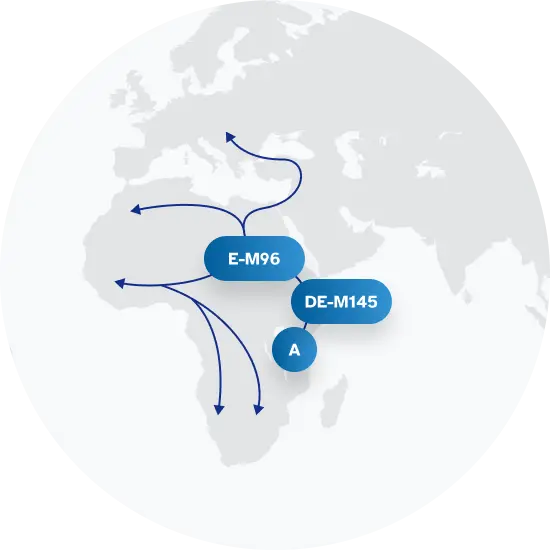Explore the Family Name Marx
How common is the last name Marx in the United States?
Based on the Decennial U.S. Census data, the surname Marx has seen an increase in popularity from 2000 to 2010. In the year 2000, the surname was ranked 3,473 and became slightly more popular by 2010, rising to rank 3,062, a change of approximately 11.83%. The count of individuals bearing this surname also increased from 9,404 to 11,716 during the same time period, depicting a significant growth of 24.59%. Furthermore, the proportion of people with the Marx surname per 100,000 people also grew by 13.75%, moving from 3.49 to 3.97.
| 2000 | 2010 | Change | |
|---|---|---|---|
| Rank | #3,473 | #3,062 | 11.83% |
| Count | 9,404 | 11,716 | 24.59% |
| Proportion per 100k | 3.49 | 3.97 | 13.75% |
Race and Ethnicity of people with the last name Marx
In terms of ethnicity, the Decennial U.S. Census data shows that the majority of people with the surname Marx identify as White, at 96.21% in 2000 and 94.43% in 2010. However, there has been noticeable change in other ethnic identities associated with the surname. For instance, those identifying as Asian/Pacific Islander rose by 69.77%, American Indian and Alaskan Native by 70.37%, and Hispanic by 53.96%. There was also a rise in those identifying with two or more races, which went up by 28.24%, and Black, which saw an increase of 34.12%, albeit these numbers remain comparatively low.
| 2000 | 2010 | Change | |
|---|---|---|---|
| White | 96.21% | 94.43% | -1.85% |
| Hispanic | 1.39% | 2.14% | 53.96% |
| Black | 0.85% | 1.14% | 34.12% |
| Two or More Races | 0.85% | 1.09% | 28.24% |
| Asian/Pacific Islander | 0.43% | 0.73% | 69.77% |
| American Indian and Alaskan Native | 0.27% | 0.46% | 70.37% |
Marx ancestry composition
23andMe computes an ancestry breakdown for each customer. People may have ancestry from just one population or they may have ancestry from several populations. The most commonly-observed ancestry found in people with the surname Marx is French & German, which comprises 32.3% of all ancestry found in people with the surname. The next two most common ancestries are British & Irish (30.8%) and Ashkenazi Jewish (12.9%). Additional ancestries include Eastern European, Scandinavian, Italian, Spanish & Portuguese, and Greek & Balkan.
Ready to learn more about your ancestry? Get the most comprehensive ancestry breakdown on the market by taking our DNA test. Shop 23andMe
| ANCESTRY BREAKDOWN | COMPOSITION |
|---|---|
| French & German | 32.3% |
| British & Irish | 30.8% |
| Ashkenazi Jewish | 12.9% |
| Other | 24.0% |

Possible origins of the surname Marx
Your DNA provides clues about where your recent ancestors may have lived. Having many distant relatives in the same location suggests that you may all share common ancestry there. Locations with many distant relatives can also be places where people have migrated recently, such as large cities. If a large number of individuals who share your surname have distant relatives in a specific area, it could indicate a connection between your surname and that location, stemming from either recent ancestral ties or migration.
Based on 23andMe data, people with last name Marx have recent ancestry locations in the United Kingdom of Great Britain and Northern Ireland and Ireland.
| RECENT ANCESTRY Location | Percentage |
|---|---|
| Greater London, United Kingdom | 65.50% |
| Merseyside, United Kingdom | 65.50% |
| West Midlands, United Kingdom | 65.20% |
| Greater Manchester, United Kingdom | 64.90% |
| Tyne And Wear, United Kingdom | 64.70% |
What Marx haplogroups can tell you
Haplogroups are genetic population groups that share a common ancestor on either your paternal or maternal line. These paternal and maternal haplogroups shed light on your genetic ancestry and help tell the story of your family.
The top paternal haplogroup of people with the surname Marx is E-V13, which is predominantly found among people with European ancestry. Haplogroup E-V13 is descended from haplogroup E-M96. Other common haplogroups include R-U152 and R-L48, which are predominantly found among people with European and European ancestry. Other surnames with similar common haplogroups are: Wolf, Mayer, Hoffman, Jacobs, Klein, Schmidt, Keller, Wagner, Schneider, Weber.
The most common maternal haplogroups of people with Marx surname are: H1, T2b, H. These most commonly trace back to individuals of European ancestry.
 Paternal Haplogroup Origins E-M96
Paternal Haplogroup Origins E-M96
Your paternal lineage may be linked to early Balkan migrants
Haplogroup E1b1b1a1b1a migrated in large numbers from the Balkans into Europe about 4,500 years ago, triggered by the beginning of the Balkan Bronze Age. During this migration, members of haplogroup E1b1b1a1b1a mainly followed rivers connecting the southern Balkans to northern-central Europe. Technological leaps often cause lineages to grow dramatically in numbers and in geographic range. The development of Bronze technology may have given men in haplogroup E1b1b1a1b1a a competitive advantage over other men, causing haplogroup E1b1b1a1b1a to proliferate and become widespread.
Your maternal lineage may be linked to Marie Antoinette
Because it is so dominant in the general European population, haplogroup H also appears quite frequently in the continent's royal houses. Marie Antoinette, an Austrian Hapsburg who married into the French royal family, inherited the haplogroup from her maternal ancestors. So did Prince Philip, Duke of Edinburgh, whose recorded genealogy traces his female line to Bavaria. Scientists also discovered that famed 16th century astronomer Nicolaus Copernicus traced his maternal lineages to haplogroup H.

What do people with the surname Marx have in common?
Spoiler alert: it's complicated. People with the same last name are usually no more genetically similar than a randomly sampled group of people from the same population. That said, people with the same surname are more likely to have similar ancestries than randomly sampled individuals. The reason is the tendency of people with similar cultural or geographical backgrounds to preferentially mate with one another. That's why people who share a surname may be more likely to share traits and tendencies in common than people within the general population. Check out the percentages below to see the prevalences of tastes, habits, and traits of people with your surname compared with prevalences among 23andMe users.
Preferences
Traits
Habits
Wellness
Are health conditions linked to the last name Marx?
The short answer is that, if there is an association between surname and health, it's usually more about your ancestry than your name. Individuals with a given surname are no more genetically similar than the general population but often have similar ancestries. The populations of people associated with those shared ancestries often have sets of genetic variations, also known as alleles, in common. Some of those alleles are associated with a greater likelihood of developing certain diseases.
Disease variant frequency by ancestry
Disease allele frequencies in populations associated with the surname Marx are shown below. Important Note: not everyone with a disease allele will develop these health condition
























